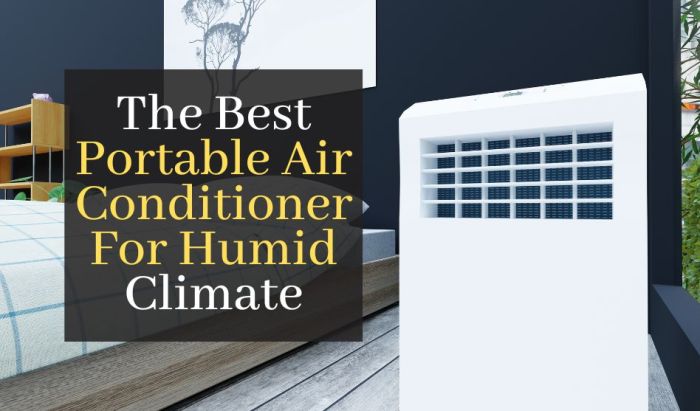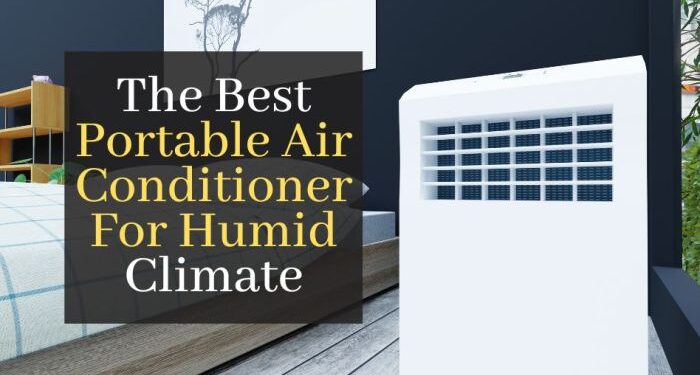In the realm of air conditioner buying guides tailored for humid climates, a plethora of considerations come into play. From room size to energy efficiency ratings, each aspect plays a crucial role in ensuring optimal cooling and dehumidification. This comprehensive guide delves into the nuances of selecting the perfect air conditioner for humid conditions, offering valuable insights and expert advice for a seamless buying experience.
As we navigate through the intricacies of air conditioner selection, understanding the key factors and types of air conditioners becomes paramount for creating a comfortable and humidity-free environment.
Factors to Consider

When buying an air conditioner for humid climates, there are several key factors to take into account to ensure optimal performance and efficiency.
Room Size vs. Cooling Capacity
It is crucial to consider the size of the room you intend to cool in relation to the air conditioner's cooling capacity. An undersized unit will struggle to effectively reduce humidity, while an oversized unit may cycle on and off frequently without adequately removing moisture from the air.
Energy Efficiency Ratings
When selecting an air conditioner for humid climates, pay close attention to energy efficiency ratings. Opt for models with high SEER (Seasonal Energy Efficiency Ratio) ratings to ensure cost-effective operation while effectively cooling and dehumidifying your space.
Adjustable Fan Speeds
Choosing an air conditioner with adjustable fan speeds is beneficial for varying humidity levels. Lower fan speeds can help dehumidify the air more effectively, while higher speeds are ideal for quickly cooling the room.
Maintenance Requirements
Don't overlook the significance of maintenance requirements when purchasing an air conditioner for humid climates. Regular cleaning of filters, coils, and ducts is essential to ensure optimal performance and prevent mold or mildew growth in the unit.
Types of Air Conditioners
When it comes to choosing an air conditioner for humid climates, it's essential to consider the different types available and their effectiveness in managing humidity levels.
Portable Air Conditioners vs. Window Units
Portable air conditioners are easy to move around and are suitable for smaller spaces, but they may not be as effective in controlling humidity compared to window units. Window units are typically more powerful and can cool larger areas more efficiently, making them more suitable for humid climates.
Ductless Mini-Split Air Conditioners
Ductless mini-split air conditioners are highly effective in controlling humidity levels because they have individual air handlers in each room, allowing for precise temperature control. These units are also energy-efficient and quieter compared to traditional window units.
Central Air Conditioning Systems
Central air conditioning systems can effectively manage humidity levels in homes by circulating cool air through ducts and vents. However, they may not provide the same level of precision control over humidity as ductless mini-split systems.
Hybrid Air Conditioners
Hybrid air conditioners combine the efficiency of an electric heat pump with the power of a gas furnace, making them a good option for humid climates. These systems can adjust based on outdoor temperatures to provide optimal comfort and humidity control indoors.
Dehumidification Features
In humid climates, dehumidification modes in air conditioners play a crucial role in maintaining a comfortable indoor environment by removing excess moisture from the air.
Importance of Dehumidification Modes
- Dehumidification modes help in reducing humidity levels, preventing mold and mildew growth, and improving overall air quality.
- By removing excess moisture, these modes can also make the air feel cooler, even at higher temperatures, enhancing comfort levels.
Adjustable Humidity Settings
- Having adjustable humidity settings allows users to control the level of moisture in the air, tailoring it to their preferences for both comfort and energy efficiency.
- Setting the humidity level too low can lead to dry air, while setting it too high may cause discomfort and promote mold growth.
Built-in Humidity Sensors
- Air conditioners with built-in humidity sensors can automatically detect and adjust the humidity levels based on the surrounding environment, optimizing performance in humid climates.
- These sensors ensure that the air conditioner operates efficiently by only dehumidifying when necessary, saving energy and reducing overall running costs.
Utilizing Dehumidification Features Effectively
- Run the dehumidification mode in conjunction with the cooling mode to achieve the desired comfort level without overcooling the room.
- Regularly clean or replace the filters to ensure optimal dehumidification performance and prevent the growth of bacteria and mold.
Maintenance and Care
Regular maintenance and care are crucial for ensuring the optimal performance and longevity of your air conditioner, especially in humid climates where mold and mildew growth can be a common issue.
Cleaning Air Filters
- Turn off the air conditioner and locate the air filter.
- Remove the filter carefully and gently clean it with a vacuum cleaner or warm, soapy water.
- Allow the filter to dry completely before placing it back into the unit.
- Repeat this process every 1-2 months to ensure proper airflow and efficient operation.
Coil Cleaning
Regular coil cleaning is essential in preventing mold and mildew growth, which can thrive in humid conditions.
- Turn off the air conditioner and locate the coils, usually found inside the unit.
- Gently clean the coils with a soft brush or vacuum to remove any dirt or debris.
- If mold or mildew is present, use a mixture of water and vinegar to clean the coils thoroughly.
- Repeat this process at least once a year to maintain a clean and healthy environment.
Professional Maintenance
Scheduling professional maintenance for your air conditioner in humid regions is highly recommended to ensure that all components are functioning correctly and efficiently.
- Professional technicians can inspect, clean, and tune up your air conditioner to prevent any potential issues.
- Regular maintenance visits can help extend the lifespan of your unit and improve its overall performance.
- Consider scheduling maintenance at least once a year, ideally before the start of the hot and humid season.
Proper Drainage
Ensuring proper drainage is crucial in preventing water accumulation and humidity issues in your air conditioner.
- Check the condensate drain line regularly to ensure it is clear of any blockages or obstructions.
- Remove any debris or algae growth from the drain line to prevent water backup and potential leaks.
- Consider installing a condensate pump if drainage is a recurring issue in your humid climate.
Closing Notes
As we conclude this insightful discussion on air conditioner buying guides for humid climates, it becomes evident that making an informed choice is the cornerstone of achieving indoor comfort and humidity control. By following the guidelines laid out in this guide, you can embark on a journey towards a cooler, drier living space, free from the woes of excessive humidity.
Question & Answer Hub
How important is it to consider energy efficiency ratings when buying an air conditioner for humid climates?
Energy efficiency ratings are crucial as they determine the operating cost of the air conditioner over time, especially in humid conditions where the unit may run more frequently.
Are portable air conditioners or window units more effective in humid climates?
Portable air conditioners provide flexibility but may struggle with dehumidification, while window units are generally more efficient at cooling and dehumidifying in humid climates.
What are the benefits of ductless mini-split air conditioners in controlling humidity levels?
Ductless mini-split air conditioners allow for zone cooling, reducing humidity levels in specific areas of the home and providing customized comfort.
How can built-in humidity sensors enhance the performance of air conditioners in humid climates?
Humidity sensors help the air conditioner adjust its operation based on the current humidity levels, ensuring efficient dehumidification and comfort.
Why is regular coil cleaning important for preventing mold and mildew growth in humid climates?
Regular coil cleaning prevents moisture buildup and mold growth, ensuring the air conditioner operates efficiently and maintains indoor air quality.















